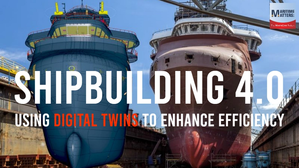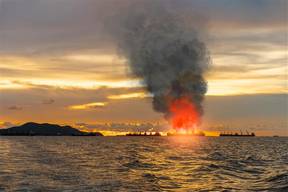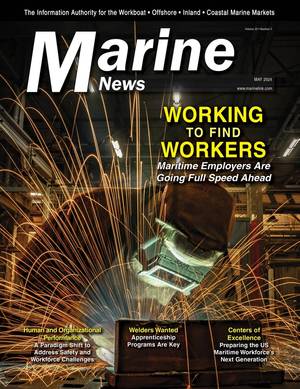A winch is a mechanism used to reel in, to let out, or otherwise adjust the tension of a rope, wire, or cable. Boats and ships make use of multiple winches to handle halyards, sheets, as well as anchor or mooring lines. The basic mechanism consists…
Sonar is a technique that uses sound to navigate, communicate with or detect other vessels, and to observe the distance and velocity of underwater objects. The acoustic frequencies used vary from extremely low (infrasonic) to very high (ultrasonic).
Shipbuilding is the construction of ships, which takes place in a specialized facility known as a shipyard. Shipbuilders, also called shipwrights, are workers which specialize in vessel construction and repair. The construction of boats is called boat building.
A ship simulator is an advanced training device; an electronic or mechanical system used to expose vessel operators and crew members to typical shipboard conditions and systems. Simulation training is not a substitute for the experience of training on an actual vessel…
All ships need maintenance and repairs. Many repair and maintanance operations can be performed at sea or by the crew in port. Complicated or large-scale repairs might require the ship to be removed from commercial operation. Classification…
Electronic devices classed for use in the marine environment. All electronics used onboard must be designed to fit in the small confines of a bridge and can come in contact with salt water, so they are made to be very water resistant or waterproof.
Marine salvage is the process of rescuing a ship, its cargo, or other property from peril. Salvage encompasses rescue towing, putting out fires, patching or repairing a ship, refloating a sunken or grounded vessel, moving a disabled vessel in order to clear navigation channels…
A port authority operates ports and other transportation infrastructure for a special-purpose district. Whether operated directly by the government or in cooperation with government agencies, North American port authorities are public entities and are governed by a board or commission.
Pods are devices which combine both propulsive and steering functions in one device. They are usually located below the stern of a ship, making use of the following internal components: a fix pitch propeller, shaft, thrust and support bearings…
Modern pipelines are installed with and other control devices (pumps and valves) to efficiently move liquids, gases, slurries (solid particulates in liquid suspension) and even solids. Pipelines usually consist of welded sections of metal pipe…
"Offshore" refers to the discovery and development of oil and gas resources which lie underwater. Usually the term refers to ocean-based oil extraction , though the term can also apply to drilling in lakes and inland seas. The remote locations…
Navigation, derived from the Latin words "navis" (meaning "ship") and "agere" (meaning "to drive") is the process of accurately determining the position and controlling the movement of a craft or vehicle along a desired course. This is accomplished…
Naval architecture is the field of engineering which deals with the design, construction and repair of ships, boats, and other marine vehicles. Ship and vessel design relies on many of the same technologies and engineering expertise found on shore…
All nations require certain standards be met by ships and other marine structures which fly their flag. A classification society, or "Class", is a non-governmental regulatory association which regulates construction of vessels and offshore structures in the maritime industry.
Maritime Security is a term which applies to a large variety of technology, devices, and operations both on deck and on shore. It can mean the simple measures used by boat owners and operators to protect individuals, vessels, and cargo from theft, sabotage, or piracy.
Contracts between vessel owners and charterers concerning the water transportation of goods are technically known in admiralty law as "contracts of affreightment". The charterer agrees to pay a freight charge for cargo space. The voyage, amount of cargo space…






